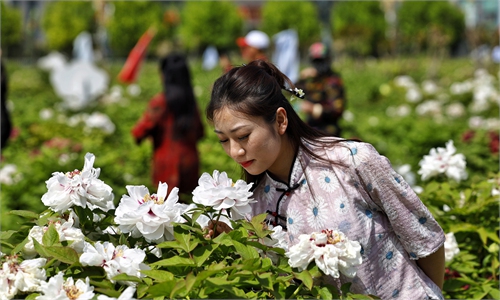Rural revitalization is becoming more attractive to young graduates to fulfill life value

With navel orange harvest on April 8, 2023, the Zigui county in Central China’s Hubei Province holds dragon boat race, skydiving and other characteristic tourism projects to help rural revitalization. Photo: VCG
When Xu Ziqi graduated from the University of Southern California in the US in 2022, her decision to go back to Luotian, a small county in Central China's Hubei Province, to help her father sell agricultural products surprised many of her peers.
Xu's father used to be a lawyer, but in 2013 he chose to return to his hometown and devote himself to rural revitalization. Influenced by him, Xu personally witnessed the transformation of a typical small and poor mountain village into the 3A tourist attraction it is now.
Originally, Xu's plan was to continue her doctoral studies in aged-care management abroad, but due to the COVID-19 pandemic that ravaged the world since 2020, she saw that farmers in the village couldn't sell their agricultural products, and tourists couldn't visit the scenic spots, which caused huge losses to local people. "I felt I might be better off returning home earlier. After my father and his peers learned about the new opportunity in e-commerce, we began to sell goods via livestreaming," Xu told the Global Times.
At first, it was quite difficult, but we were also lucky, Xu said. At the same time, Xu and her team deeply realized the dilemma of the shortage of talent for rural revitalization. "When I first returned to my hometown, I started with packing. We also participated in research studies, catering, hotels, warehousing and logistics, and landscape architecture. After preparing for a year, I established a dedicated e-commerce company. Besides, I also started health care services because my second master's degree is in aged-care management. I also set up a rural artisan school, hoping that everyone in the county can learn a skill to make a living," Xu noted.
Currently, Xu's team consists of young people born after year 1990 and 2000. And they plan to recruit 22 fresh graduates in the upcoming graduation season.
"The greater the responsibility, the greater the pressure, and the heavier the burden I carry. For me, being able to help more people is the driving force that keeps me rooted in this small county," Xu said.
Xu is not the exception to graduates going back to hometowns. A public welfare activity to help sell honey for the villagers in South China's Yunnan Province with friends made a deep impression on Qian Weixin about the potential role of returning to his hometown to start a business. "Although it has nothing to do with making money for myself after the villagers sell the honey, children from poor families can have new shoes, and the life of beekeeping families can be improved," Qian said.
Of course, the main focus is the business opportunities behind honey sales. The honey-rich villages in Xishuangbanna are far away from the consumer markets in big cities like Shanghai, and Qian hopes to connect the production and sales channels.
Rather than just saying that those who return to their hometowns hope to "save" their hometowns to some extent, it is more accurate to say that the countryside, while nurturing them, also provides them with a stage to show their talents and ambitions.
By April 2022, more than 11 million people had returned to their hometowns to start businesses, according to the Ministry of Agriculture and Rural Affairs data.
Xinhua News Agency reported on May 4, the Youth Day, that Chinese President Xi Jinping has replied to a letter from students participating in a program at the China Agricultural University that dispatches students to the frontlines of agricultural production.
In the letter, Xi encouraged the students to make greater contributions to rural revitalization. Replying to the students' remarks that they had learned to seek truth from facts and maintain close ties with the people only when they went deep into China's rural areas, Xi said that this is the spirit that Chinese youth in the new era should have.
Young people who return to their hometowns to start businesses are full of hope for tomorrow and usually have a clear life plan, experts said. As Xu put it, "when your efforts can change some people's lives, you will realize the value of your own life."
The story of young graduates returning to hometown to start their own businesses has not only caught the attention of domestic netizens but also foreign media outlets. On May 5, Radio Free Asia published an article, which described the development of college students returning to their hometowns as "turning young intellectuals into peasants and lowering their knowledge level," while alleging that encouraging such a spirit of hardship is the reproduction of the Cultural Revolution (1966-76).
However, this deliberate and prejudiced view has been rejected by these young people. "The concept of 'educated youth becoming farmers' is inherently discriminatory. Some people think we are still like before, that returning to the countryside means farming, but now the countryside has integrated a lot of high technology and new concepts, and there are many cultured and knowledgeable farmers," Xu said.
According to the latest data released by the National Development and Reform Commission, from 2017 to 2021, the per capita disposable income of rural residents in China increased by 28.9 percent in real terms, and the conversion rate of agricultural products reached 70.6 percent. This signifies new developments in China's rural industries.
Graduates are shifting their employment preferences from concentrating in major cities like Beijing, Shanghai and Guangzhou, to being open to third and fourth-tier cities, and even small counties or towns, leading to a more diversified geographical spread in job seeking, Xiong Bingqi, director of the 21st Century Education Research Institute, told the Global Times on Wednesday.
"Today's China is not what it was decades ago. Each student is unique in terms of personality, interest, and ability, and career choices should also develop in a personalized way. Instead of making stability the primary consideration for choosing a career, it is the pursuit of more challenging industries, units, and positions from the perspective of individual value realization that should be the spirit of young Chinese people," Xiong said.


